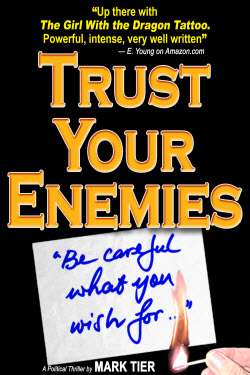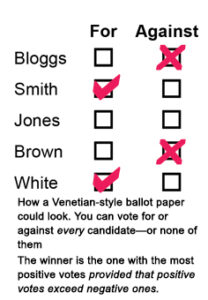Seven More Not-So-Modest Proposals to Improve the Political Process
Herewith: seven more entirely reasonable reforms that many people will find acceptable—the main exceptions being (surprise!) politicians and bureaucrats
1. The Venetian Model
An intriguing provision in the Republic of Venice was that every public official had to take an oath of office. From the Doge (equivalent of president or prime minister) to lowliest officeholder.
One of several reasons the Venetian Republic lasted for almost a thousand years—until Napoleon invaded in 1797.
The oath was not just a formality. Far from it: more a contract than an oath. And any officeholder who broke his oath could be sued and fined for the equivalent of breach of promise or breach of contract.
Similar to the impeachment process in the United States?
Not really.
True, the president of the United States takes an oath. And can be impeached for “treason, bribery, or other high crimes and misdemeanors.”
But the impeachment process is cumbersome: initiated by the House of Representatives by a simple majority, which is the equivalent of an indictment, and then tried by the Senate, conviction requiring a two-thirds majority.
Only two US presidents have ever been impeached: Andrew Johnson (1868) and Bill Clinton (1998). Both were acquitted by the Senate.
In Venice, by contrast, there was a special attorney’s department whose primary function was to prosecute officeholders who had broken their oath.
And they often were. From the Doge to Admirals of the Fleet, the Venetian equivalents of Ministers and Congressmen—to the lowliest public official. Sometimes they were even bankrupted by the amount they were fined.
Adopting a similar procedure would certainly keep politicians and bureaucrats on their toes!
2. Negative votes
Another interesting feature of the Venetian Republic was negative votes.
Instead of just voting for someone, you could also vote against. The winner was the candidate with the most positive votes, provided that the total positive votes exceeded the total negative votes.
At the moment the only way you can vote against someone is to vote for someone else. Or stay home on election day.
Imagine what might happen if you could cast negative votes along with positive ones.
For example, just prior to the 2016 American presidential election polls gave Donald Trump an unfavorable rating of 55%, slightly better than Hillary Clinton’s negative rating of 55.3%.
Had voters been able to cast negative votes they might both have lost.Fancy that!
Similarly, a September 2020 Gallup poll reported Trump’s and Biden’s favorable/unfavorable ratings as 41/57 and 46/50 respectively. If negative votes were possible, another pair of losers.
This is hardly untypical. In a November 2018 Australian poll in asked the question “Who would make the worse prime minister?” 36% of respondents nominated the opposition leader, Bill Shorten, as the better PM, while 50% said the opposite. The sitting prime minister, Scott Morrison, didn’t do that much better: 42% for, 47 against. A race to the bottom!
And in Britain, an April 2018 poll measured then-PM Theresa May’s personal approval rating at -8, while the opposition leader at the time, Jeremy Corbyn, weighed in at -19.
Given the option of negative votes along with positive ones (don’t hold your breath) an overwhelming majority would probably have voted for none of the above!
The implications of negative voting are fascinating.
Currently, a political party’s aim is to field a candidate who will receive more votes than the opponent. No matter that all the candidates have approval levels under 50%.
As a joke going around during the 2016 US presidential election put it:
What’s the good thing about Trump? He’s not Hillary.
What’s the good thing about Hillary? She’s not Trump.
Not very funny!
At the moment, from the political parties’ point of view the key to victory is not to have a candidate who the majority of voters approve of (though that’s a big bonus!) but to have a candidate whose disapproval rating is lower than the opponent’s.
Negative votes turn things around 180 degrees. When the winner is the one whose positive votes must exceed his or her negative ones, a low disapproval rating would suddenly become essential to victory.
Although . . . what would happen when there’s no clear winner in the first round, so there’s a run-off—and negative votes exceed positive votes for both remaining candidates?
Start over??
3. By Lot(tery)
Another Venetian practice.
At one point in its history, a short list of candidates for certain offices was chosen by vote of the General Assembly or (later) by a committee.
Those candidates’ names were all put in a jar and the name drawn out was the new officeholder.
With the aid of modern technology, we could take this idea a few steps further.
The name of everyone eligible to vote could be put into a database, and the first 435 names thrown up, like a lottery, would make up the next US congress.
Another 100 (or more) would have to be drawn as, inevitably, more than a few of those first 435 people would probably refuse the honor.
The chances of any one of those “winners” being re-elected is so close to zero it’s probably not worth thinking about.
4. Sunset Laws
Like food products and other perishables, every law and regulation should come with an expiry date. Let’s say: a month or so before the next election.
That way, the politicians would be so busy reenacting all the old laws they wouldn’t have enough time to think up too many new ones.
5. A Guaranteed Way to Cut Government Spending
Governments everywhere have the great advantage of never having to worry about bankruptcy.
When you spend more than you earn, you’re broke. When a business’s sales fall too much (or expenses are out of control) the liquidators are called in.
When a government spends more than it “earns,” it merely prints the difference.
The true masters of governments—the bureaucrats rather than the politicians—jealously guard their privileges. And one of those privileges is their annual budget.
As there is always some politician attempting to score brownie points by finding a way—any way—to trim government spending, department heads ensure that when it’s time to prepare next year’s budget, they all make sure that they are in a position to argue that they simply don’t have enough money.
To “prove” it, at the end of every financial year every government department rushes to spend the last of its money so next year’s budget won’t be cut.
Change the incentives.
For every dollar they come in under budget, pay fifty cents as a bonus to the staff. Hell, pay out the lot.
Preferably as retirement bonuses for those junior bureaucrats who’d rather go fishing.
But then . . . the department’s pre-distribution spending becomes next year’s budget.
Waste will disappear almost overnight.
Well . . . at least until the bureaucrats figure out a way around it.
6. “Election” by Assassination
Science fiction offers a number of “off-the-wall” examples. The most outrageous being Robert Sheckley’s short story, A Ticket to Tranai, first published in the October 1955 issue of Galaxy Science Fiction magazine.
SPOILER ALERT! If you’re an SF fan who has never read this story I suggest you skip immediately to item #7.
Or: you can read A Ticket to Tranai online here (and then come back . . . and if you’ve never read a Sheckley story before you’re in for a treat)
Marvin Goodman travels from Terra to Tranai where, shortly after arrival, he meets the immigration minister who asks him if we would like to become Supreme President.
After considerable persuasion, Goodman agrees thinking, “Well, someone had to rule. Someone had to protect the people. Someone had to make a few reforms in this Utopian madhouse.”
A moment later, the President rushes in and as he is about to pass his medallion of office to Goodman suddenly explodes, leaving Goodman staring at a headless corpse.
It turns out that any citizen may register his or her dissatisfaction with any sitting official, whether President or dogcatcher by visiting a Citizens Booth and register that protest.
When those protests reach a certain number (which Sheckley does not specify) the medallion which every official wears blows up.
Under such an “election” process nobody in his or her right mind would accept the “honor” of being “president.” If that’s a flaw (and I’m far from convinced it is) so be it.
“None of the above” in spades!
Any volunteer for the post who thinks the presidency is a ticket to power is unlikely to have very long life expectancy.
Don’t you still want the Presidency?” asked Meith [the immigration minister, at the conclusion of Sheckley’s story].
“No!” [Goodman replied.]
“That’s so like you Terrans.” Meith remarked sadly. “You want responsibility only if it doesn’t incur risk. That’s the wrong attitude for running a government.”
Replace “Terrans” with “politicians” in the previous sentence and it makes almost universal sense.
Sheckley’s system could be made less lethal (but no less effective) with the aid of modern Technology, into . . .
“Instant Recall”
Voters could simply register their disapproval of any official, either over the internet or in person. And when those “negative votes” reach X% (I would suggest 33%; but no doubt politicians, were they to accept such a reform, would insist on at least 50% plus one).
When (or if) the “magic number” is reached, that official is out on his or her you-know-what.
Existing recall provisions, mainly in the United States, are effectively a second election. This one focused on unseating the existing “representative.”
The “Instant Recall” process applies to all government office holders. And the “votes” are cumulative. Thus (hopefully) forcing politicians to be on their best behavior all the time rather than just at election time.
And finally . . .
7. An Almost Painless (Australian) Proposal for Taxpayer “Relief” By Enabling Voters to Show Their Respect for Politicians in a Suitably Appropriate Manner
By positioning dunnies* (Australian slang for outhouse) atop the Senate and the House of Representatives of the Parliament of Australia, as sketched in above, Australians would be able to show their true appreciation of politicians.
At a charge of say $10 a time (double when Parliament is in session?) it’s conceivable that the government could pay off the national debt in a painless yet highly pleasurable way.
As an extra incentive, the ten bucks could be tax-deductible!
And there’s no reason (other than fastidiousness) why other parliaments all over the world could not adopt the same proposal.
*In case you’ve never come across the term “dunny” before, read on:
The Aussie Dunny Poem
They were funny looking buildings, that were once a way of life,
If you couldn’t sprint the distance, then you really were in strife
They were nailed, they were wired, but were mostly falling down,
There was one in every yard, in every house, in every town.
They were given many names, some were even funny,
But to most of us, we knew them as the outhouse or the dunny.
I’ve seen some of them all gussied up, with painted doors and all,
But it really made no difference, they were just a port of call.
Now my old man would take a bet, he’d lay an even pound,
That you wouldn’t make the dunny with them turkeys hangin’ round.
They had so many uses, these buildings out the back,
You could even hide from mother, so you wouldn’t get the strap.
That’s why we had good cricketers, never mind the bumps,
We used the pathway for the wicket and the dunny door for stumps.
Now my old man would sit for hours, the smell would rot your socks,
He read the daily back to front in that good old thunderbox.
And if by chance that nature called sometime through the night,
You always sent the dog in first, for there was no flamin’ light.
And the dunny seemed to be the place where crawlies liked to hide,
But never ever showed themselves until you sat inside.
There was no such thing as Sorbent, no tissues there at all,
Just squares of well read newspaper, a hangin’ on the wall.
If you had some friendly neighbours, as neighbours sometimes are,
You could sit and chat to them, if you left the door ajar.
When suddenly you got the urge, and down the track you fled,
Then of course the magpies were there to peck you on your head.
Then the time there was a wet, the rain it never stopped,
If you had an urgent call, you ran between the drops.
The dunny man came once a week, to these buildings out the back,
And he would leave an extra can, if you left for him a zac.*
For those of you who’ve no idea what I mean by a zac,
Then you’re too young to have ever had, a dunny out the back.
(*A “zac” was slang for a sixpence coin before decimal currency came into Australia in 1966)
And . . . One Other Thing . . .
As you may have gathered, I am somewhat cynical about politics and politicians.
In my novel Trust Your Enemies (see below), the character Karla Preston summarized my views when she commented that “Politicians are just used car salesmen in fancy dress.”
Perhaps you think this is a slur on used car salesmen.
Not so.
Used car salesmen may have a poor reputation—which was certainly the case when I was younger. But there are enormous, and very important differences, between voting for or against a politician and buying a used car.
First of all, you have an enormous selection of used cars to choose from. Not just two, or if you’re lucky three, different models.
Second, you’re not stuck with one used car salesman for the next two to six years.
Third, make sure your used car comes with a guarantee. Then, if you purchased what turns out to be a clunker, you have the option of redress.
By comparison, a politician’s election “promises” do not come with any guarantee.
If reneged upon, you have to wait for another two to six years before you have the opportunity to throw the scoundrel out.
With zero guarantee of success.
Nevertheless, I suppose that those of us who live in democracies should be thankful that we can, at least, vote against the greater of two evils. An option people in one-party states are denied.
Unfortunately, the lesser of two evils is still evil.

“Politics, sex, corruption, blackmail, lies . . .
and that’s just the first three pages!”
As teenagers, Alison and Derek were lovers—but chose opposite directions which tore them apart.Now adults, the pursuit of their incompatible dreams turns them into enemies who must deny their love for each other. But the real-world consequences of their actions bring them together in an alliance of mutual self-preservation—and cause them both to question their every belief.
Rave Reviews from Amazon Readers:
“This is one of the best books I have ever read.”
“Up there with The Girl With the Dragon Tattoo. Powerful, intense, very well-written ”
“Mark Tier has a writing style as fluid as John Grisham’s or John Le Carre’s”
“Worthy of Ayn Rand . . . a spell-binding adventure ”
“Multiple plots, action great . . . and a nice touch of sex.”
See all customer reviews | Read the first chapter online | Download Part I in Kindle or epub format










